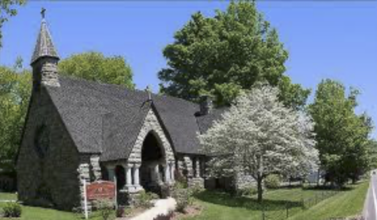Answered prayers
Cover Story
Updated heating system cures the ills of century-old Baptist church
By william montgomery
Driving up Connecticut’s old Route 7 through the towns of Norwalk, Wilton, Redding and Ridgefield, up into Danbury, you pass through some of the state’s most beautiful scenery. As we took a ride up that route to take a look at a recent steam boiler installation the fall foliage was at its peak. As we thoroughly enjoyed our gorgeous leaf-peeping ride and half day out of the office we were looking for a traditional white clapboard Baptist church.
When we saw a beautiful old stone church with a red door and a sign out front that said Wilton First Baptist Church, we did a double take. My brief knowledge of church architecture led me to believe Episcopalian churches were usually stone with red doors. As it turns out, this beautiful old stone relic of the 1890s was indeed the home of the Wilton Baptist Church, but not until it had served as the Wilton Episcopalian Church until 1977.
Over the years, heating the church hasn’t been without its problems. When the Baptist parish was in the process of closing on the sale of the church, the existing boiler, a converted coal-fired steel boiler, dry fired. This started a major fire that caused significant damage throughout the church. Some of the burnt timbers are still evident in the boiler room today.
When the church found itself most recently with three out-of-code residential steam boilers that had also suffered cut-off failures, the state building inspector told them it was time to bring the boiler room up to date. The church’s board of trustees looked at both the steam heat and domestic water heating, done with electric heaters, which were being replaced at the rate of one every two years, when they decided it was time for a change. They needed to break from the church’s unlucky history of boiler dry fires and install a reliable, low-maintenance steam-heating system. They turned to Connecticut Refining Company of West Haven, Conn., for the solution.
CRC selected Peerless’ venerable steamer, the SCT, for this job. They used the Peerless SCT-09, with its large steam chest and high water content, to heat the main church and an SCT-04 to heat the office space and to fire a Vaughn T80RB 80-gallon hot-water storage tank for domestic water needs.
Hank Mailhot, CRC’s training and technical manager said, ‘We like the durability of the stone-lined tank, especially when dealing with the high temperatures of steam.”
CRC knew that it would have to turn to the latest technology to protect this landmark church better than in years past. They equipped the SCTs with CycleGard foam compensating low-water cut-offs and VXT Series water feeders from Hydrolevel Company.
‘We needed the safest, most self-sufficient system we could put together for a parish with no regular maintenance personnel,” said Bob Cherico, heating manager for CRC’s parent company, Heating Oil Partners. ‘The person maintaining the boiler does it on Sunday before he goes upstairs and makes coffee and puts chairs out. That guy is me!”
They selected Hydrolevel’s newest CycleGard, the CG450-2060, with a longer 20-minute run cycle. They wanted a long run cycle to make sure steam gets up quickly on Sunday mornings. Cherico said the CycleGard’s self-checking action gives him the confidence to let these boilers operate with minimal maintenance for longer periods of time than older probe or float designs.
Another advantage of the self-checking probe-type controls is that Cherico doesn’t have to risk the possibility of getting some of that muddy boiler water on his wingtips before Sunday service while blowing down an old-style float control.
‘I just look at the VXT feeder and the water meter on my VXTC Commercial feeder to check water consumption, take a quick look at boiler levels and I’m off to hand out programs for the morning service,” he said.
With shiny shoes.
William Montgomery is a spokesman for Hydrolevel Company. He can reached at (203) 776-0473, ext. 265, or by e-mailing wmontgomery@hydrolevel.com.


